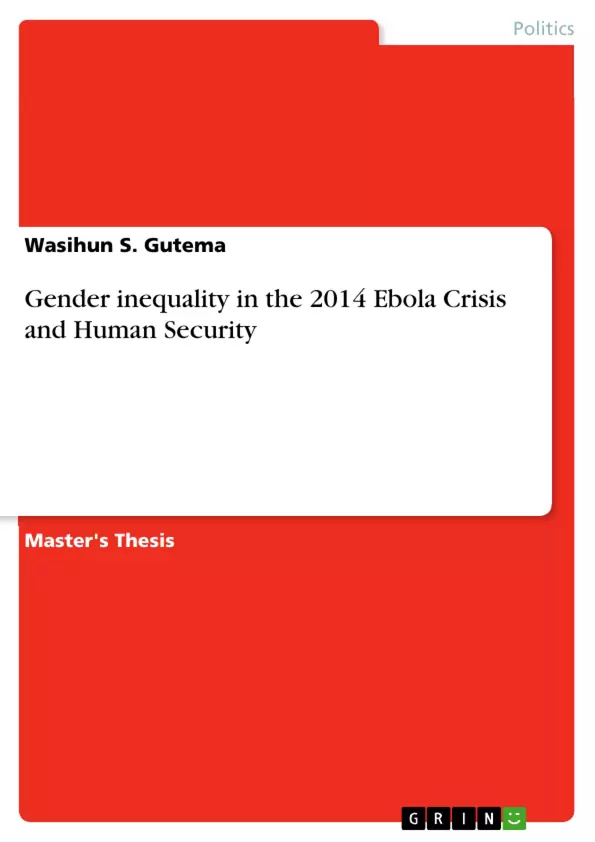The purpose of this research is to examine how the 2014 Ebola crisis affected women in West Africa from a human security perspective. The goal is to articulate how gender inequality has aggravated the spread of the Ebola virus diseases due to the unequal position held by women stemming from a patriarchal doctrine ingrained in Western African communities’ cultures, governmental administrative incapability, and economic and social inequality.
Gender inequality, which is deep-rooted in the culture of the Western African society, played a tremendous role in the spread of the disease resulting in more cases and deaths of the Ebola Virus diseases to the women population compared to male. It thus created a human security breach where women were exposed to insecurities. Gender inequality was the resultant effect from gender differences that paved the way for insecurities.
Upon examination of the Ebola crisis in West Africa, it became clear that women were the most affected segments of the society in West Africa particularly in the three most hit countries of Guinea, Liberia and Sierra Leone. Through showing the cruelty of cultural doctrine and gender inequality that have made the women population insecure, this research highlights the importance of gender and cultural equality along with better policy to protect women’s rights and to raise public awareness concerning harmful culture and devouring virus like Ebola in West Africa.
Inhaltsverzeichnis (Table of Contents)
- Abstract.
- Research Proposal.
- Literature Review..
- Gender disparity and infectious diseases.
- Infectious diseases and Human Security.
- Feminism and Infectious diseases through the lenses of the Ebola virus .
- Research Methodology
- Data Analysis.
- Limitations (weaknesses) of the research design …………………
- Strengths in this proposed study.
- Discussion....
- From Gender perspective..
- Time Poverty as a contributing factor.
- Carrying Roles.
- When Culture is the enemy
- A Human Security Perspective ....
- How fear aggravated the Ebola Expansion among the women population ....
- Government failure........
- From Gender perspective..
- Conclusion
- References..
Zielsetzung und Themenschwerpunkte (Objectives and Key Themes)
The objective of this research is to investigate the impact of the 2014 Ebola crisis on women in West Africa from a human security perspective. The study aims to explore how gender inequality has exacerbated the spread of Ebola due to women's unequal position resulting from patriarchal doctrines ingrained in West African societies, governmental administrative shortcomings, and socioeconomic disparities.
- Gender inequality and its impact on the spread of Ebola.
- The role of cultural norms and patriarchal structures in perpetuating gender inequality.
- The link between gender inequality and human security vulnerabilities.
- The influence of governmental policies and infrastructure on the Ebola outbreak.
- The importance of addressing gender inequality and promoting women's rights for effective disease prevention and control.
Zusammenfassung der Kapitel (Chapter Summaries)
- The abstract provides an overview of the research, highlighting the impact of gender inequality on the spread of Ebola and the subsequent human security breaches experienced by women in West Africa.
- The research proposal establishes the context of the Ebola crisis, outlining the virus's characteristics and its global impact, particularly its disproportionate effect on women. It emphasizes the role of gender inequality in perpetuating the spread of the virus and undermining human security.
- The literature review examines existing studies on gender disparities in infectious diseases, the relationship between infectious diseases and human security, and the intersection of feminism and infectious diseases through the lens of the Ebola outbreak.
Schlüsselwörter (Keywords)
The primary keywords and focus topics of this research include gender inequality, Ebola virus disease, human security, feminism, carrying roles, time poverty, traditional healing, quarantine, Mano River Union (Guinea, Liberia & Sierra Leone), and cultural norms. These keywords encapsulate the central themes of the study, emphasizing the interconnectedness of gender, culture, health, and security in the context of the 2014 Ebola crisis.
Frequently Asked Questions
How did gender inequality affect the spread of Ebola in West Africa?
Gender inequality, rooted in patriarchal structures, placed women in more vulnerable positions, leading to higher infection and death rates among women compared to men.
What is the "Human Security" perspective used in this research?
The research examines how the crisis breached human security by exposing women to specific insecurities caused by social, economic, and governmental disparities.
Which countries were most affected during the 2014 Ebola crisis?
The study focuses on the three hardest-hit countries: Guinea, Liberia, and Sierra Leone (the Mano River Union).
What are "Carrying Roles" and "Time Poverty" in this context?
These terms refer to the traditional roles women play as caregivers, which increased their exposure to the virus and limited their ability to seek safety or economic stability.
What are the policy recommendations of this study?
The research highlights the need for better policies to protect women's rights, promote cultural equality, and raise awareness about how traditional practices can impact disease transmission.
How did government failure contribute to the crisis?
Administrative incapability and lack of infrastructure exacerbated the expansion of Ebola, particularly among the vulnerable female population.
- Quote paper
- Wasihun S. Gutema (Author), 2017, Gender inequality in the 2014 Ebola Crisis and Human Security, Munich, GRIN Verlag, https://www.grin.com/document/368125



